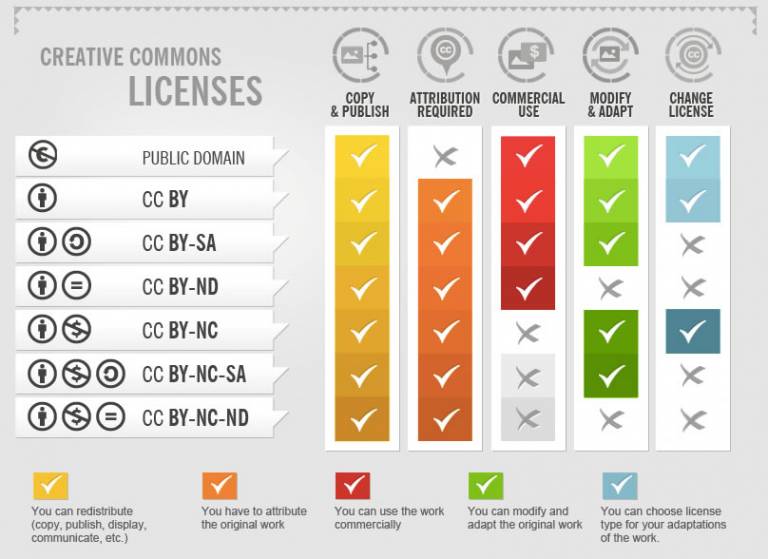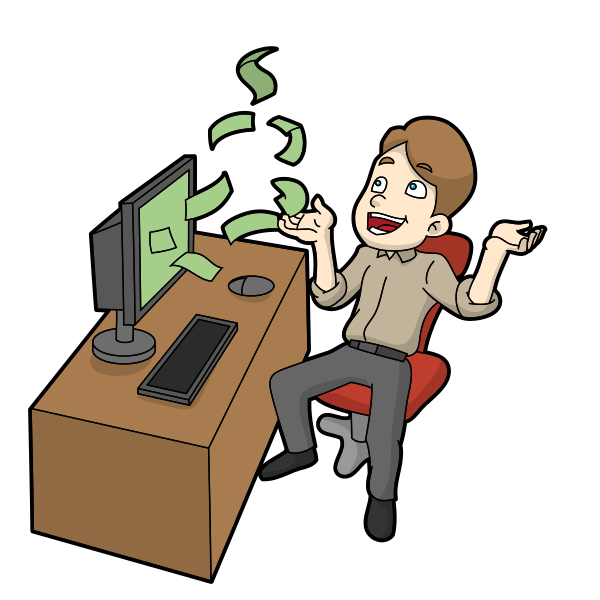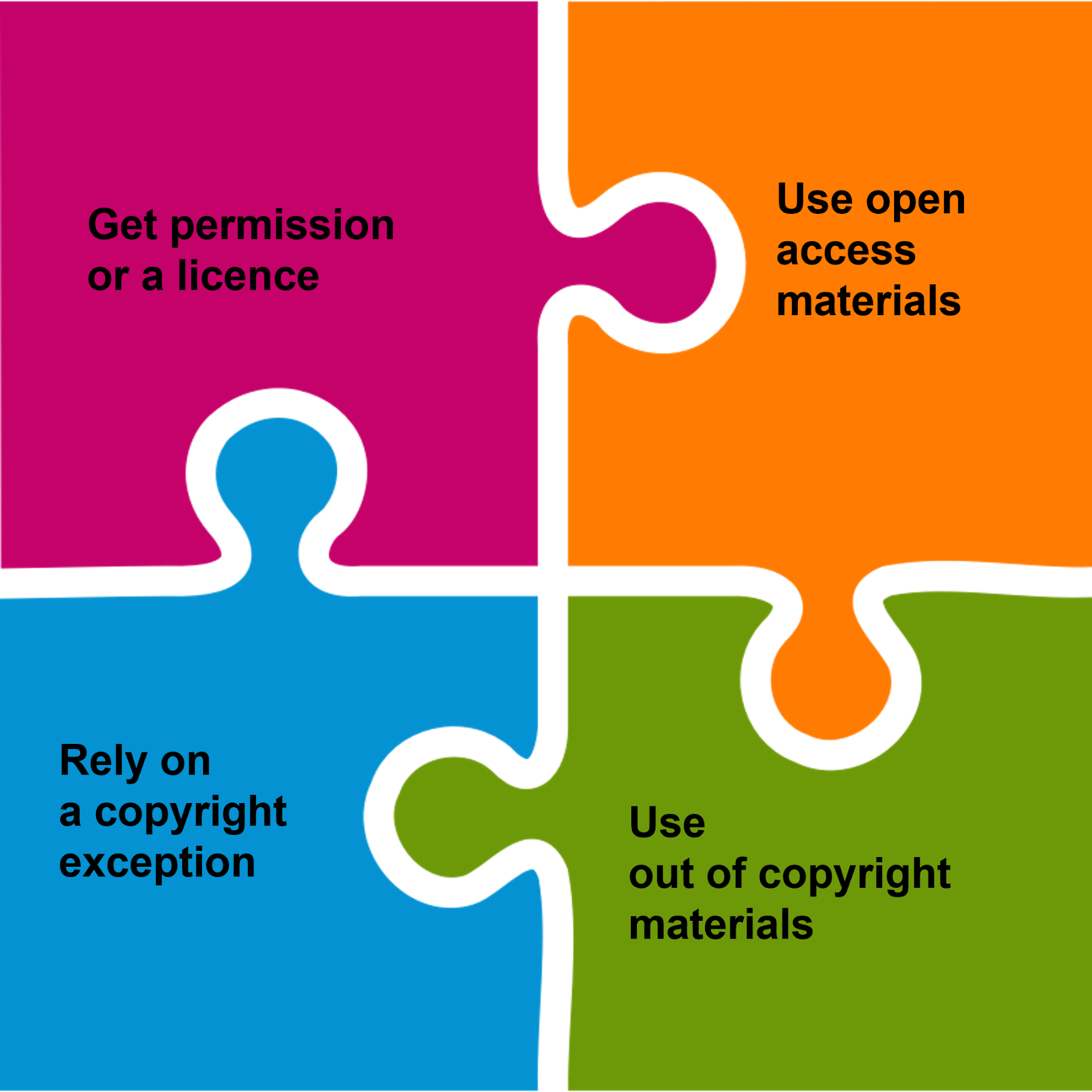This guide for UCL students at all levels of study offers copyright advice to consider when publishing your work on OpenEd@UCL, the UCL Open Education repository.
What will I learn from this guide?
- How to use the works and ideas of other people in a professional way, without infringing copyright – this includes images you find on the Internet.
- When you need to ask permission to re-use other people’s work.
- How to protect the copyright in your work.
- What an (open) licence is and how to license your work.
Introduction
- Why do I need to think about copyright?
Copyright is an important aspect of academic work and needs to be considered from an early stage in your planning. This applies to your dissertation or thesis but also any other academic outputs such as journal articles, blog posts, diagrams, and film.
When you post your work on OpenEd @ UCL, the UCL Open Education repository, it will be available to anyone with an Internet connection. In copyright terms you are “communicating your work to the public.” This is a restricted act, which needs the permission of the copyright owner. That’s fine if it’s all your own work, but you must consider whether you have included material by anyone else.
- Reusing other people’s work
Have you included material by other people in your academic work, such as text, photographs, diagrams, or sound recordings? This is also referred to as “third party material” and unless it is very old, it is likely still to be copyright-protected. Copyright in most materials lasts for the author’s lifetime plus 70 years. For example the author George Orwell died in 1950, which means that his published works will not come out of copyright until January 2021. From that time his published works can be freely reused.
- What is the difference between copyright infringement and plagiarism?
Copyright infringement has similarities with plagiarism. Both arise from misusing other people’s material and they often overlap.
Plagiarism is a matter of academic integrity which arises from using the material or the ideas of others without acknowledgement and presenting them as if they were your own work.
Copyright is a legal issue. Infringement occurs when you reuse material created by others without permission from the copyright owner. If you infringe copyright there can be legal consequences. Copyright does not protect ideas as such, only the way that they are expressed in creative work. On the other hand, using other people’s ideas without crediting them can certainly give rise to issues of plagiarism.
- My work does include third-party material, what do I need to do?
Review the copyright situation:
- Is this material licensed for reuse by either a Creative Commons licence (CC licence) or a similar licence? Or…
- Is what I am doing covered by one of the exceptions in the copyright legislation? If the answer to both questions is “no” then you will need to ask permission from the copyright owner.
- Have I acknowledged the author and source adequately? This question is important whether you are using the work with permission, under a licence, or relying upon an exception to copyright.
- Who owns copyright in a work?
The author is usually the first owner of copyright, but copyright can change hands and is often assigned to a publisher.
When seeking permission it is often better to start by contacting the publisher.
Copyright ownership is sometimes difficult to track down, for example in the case of unpublished works or films. You may find some useful sources listed in the “UCL copyright resources” reading list under the heading “Seeking permission and tracing ownership.”
Managing copyright risk
- Seeking permission: some important points
Seeking permission from a copyright owner can take some time. It is best to start at an early point and to consider any copyright issues as you proceed with your academic work.
Try to avoid leaving copyright until the end.Keep a record of your correspondence with copyright owners, particularly any permissions you receive. Bear in mind that silence from the copyright owners does not imply consent to your request.
Permission from the copyright owner should cover everything you intend to do with your academic work. You should be specific about what you plan to do with your work, such as posting it in OpenEd @ UCL or plans to publish your work in other ways. Otherwise you may find you need to apply for additional permissions later on.
- Alternatives to seeking permission 1: The copyright exception for “Quotation”
There is a broad exception for quotation to be found in Section 30(1ZA) of the Copyright, Designs and Patents Act 1988. There is a “fair dealing” test to apply and you should ask yourself:
- Could I be damaging the interests of the copyright owner?
- Am I reusing more of the work than is justifiable in the context?
- Have I credited the author and source adequately?
In an academic context, limited textual quotations from a book or a published paper will often be covered by the exception. Relying on the exception for images such as photographs and graphics can be more problematic. In general, it is safer to have permission or to use licensed material, but the statutory exceptions are also there to be used.
- Alternatives to seeking permission 2: Creative Commons licences (CC Licences)
Some material on the internet is already licensed by the copyright owner for others to reuse:
- Creative Commons licences are the most popular form of licence, see creativecommons.org.
- CC licences offer a wealth of material in different formats which can be reused without cost or permission.
- You must adhere to the licence terms, which are quite straight-forward.
They are particularly useful for locating images and photographs which can readily be reused. You can search for licensed material from the CC website and from other popular sites such as Flickr and Google, by applying the appropriate licence filters.
You can also search for openly-licensed images to reuse on the Open Education webpage.
- Reusing images: photographs, diagrams graphics etc.
Reusing images often poses more problems than text. In copyright terms an image is a complete “artistic work” so you will be reusing 100% of a copyright protected work.
This can be harder to defend as “fair dealing” but in some cases you may still be able to rely upon the quotations exception.
Photographs on the internet often lack information about who created them or who owns the copyright, which increases the danger of infringing copyright inadvertently.
Searching for images that are covered by a Creative Commons licence is a good solution.
- What are Orphan works?
If you need permission to reuse third party content and it proves impossible to identify or locate the copyright owner despite your best efforts, this may be an “orphan work”.
The UK intellectual Property Office (UK IPO) offers an Orphan works licensing service which allows you to reuse an orphan work for a modest fee.
You must demonstrate that you have carried out a “diligent search” for the copyright owner. This is worth bearing in mind if the content is crucial to your academic work.
Copyright in your work
- Your copyright
As a UCL student the copyright in your work belongs to you, unless you have assigned it to someone else. The UCL IPR policy contains more detail and can be found on the UCL website.
If you wish to use your academic material that you have published previously, for example a thesis, you may find you need permission from the publisher.
Sometimes authors are surprised to find they need permission to reuse their own work but this can arise if you assigned your copyright to a publisher as part of a publishing agreement.
Before signing a publisher’s contract you should read it carefully and be prepared to negotiate.
- Open access publishing and your copyright
Academic work at all levels across UCL may be published in OpenEd @ UCL. Your course tutor will inform you if there is a chance your work will be uploaded to OpenEd @ UCL and you will need to consent to this.
PhD theses are deposited in UCL Discovery, an open access platform.
Publishing in UCL’s open access repositories is beneficial for:
- Making your work more visible to a wider audience.
- Providing a stable platform and URL for your work, so that it is easy to share it with the research community.
- Meeting the open access requirements of funders.
- Points to note about open access publishing
When your academic work is available on the internet, via OpenEd @ UCL or another platform, any unresolved questions around third party copyright may become more of an issue.
You need to consider carefully each item of third party content before your work is posted online:
- Do you have permission or a licence to re-use the content?
- Do you feel confident in relying upon a “fair dealing” exception?
- Have you acknowledged the author and source?
There is often an element of judgement and you may need to seek advice from someone else such as your supervisor or the UCL Copyright support team.
- Applying an open licence to your work
When publishing your academic work on the internet we recommend that you share it using an open licence. This will ensure that others can re-use your work and you will be credited as the author/ creator, since that is one of the CC licence conditions. There are some restrictions you can place on how people use your work, and the table below provides an example of access restrictions provided by various Creative Commons licences.

Image above: "Creative Commons licences" by Foter, which is licensed under the CC BY-SA 4.0 licence.
In order to apply a licence, you only need to add the licence label to the front of your work.
- Group work
When producing work by collaborating with other students, you will need to agree with your group members on copyright and how to share (licence) your work.
- Data protection
You should be mindful of any personal information you include in your work, especially if you are putting it online, as this will be viewable to anyone with an Internet connection. Personal information can include your name, what course you are on, or other identifying information. If you do not want to publish your name alongside your work, speak to your tutor or supervisor about using a pseudonym instead of your full name.
Further help with copyright issues
If you have questions about copyright please contact the Library’s copyright team by emailing copyright@ucl.ac.uk.
You will also find further information on the copyright pages, of the UCL website, including training opportunities.
 Close
Close







